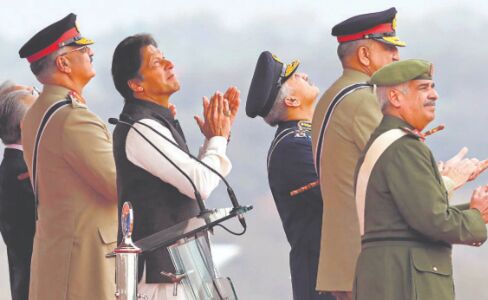Unabated criticism
Pakistan government should engage with critics to find progressive solutions instead of stifling EC and putting a veil on its failures

The recent election for chairmanship of the Senate in Pakistan slurred the image of Prime Minister Imran Khan and the ruling establishment. Apart from this, the humiliating defeat of PTI favourite Hafeez Shaikh at the hands of PPP leader Yousuf Raza Gilani continues to haunt the ruling dispensation. It seems that the trounced lot has still not come to terms to accept reality. This has evoked unabated criticism stemming out from unfair and sweeping castigation by the PM and his coterie accusing the Election Commission of Pakistan (ECP) of its 'ineptitude'.
Stepping up their criticism against Imran Khan, perhaps in open defence of the ECP, political commentators have charged the government for its baseless demand of resignation Election Commissioner. This is seen as a very ridiculous, childish and immature demand. Moreover, experts feel that the government is exposing its authoritarian mindset by ventilating such regressive statements. Additionally, the government came under heavy criticism recently after a group of federal ministers claimed at a press conference that ECP cannot continue functioning as it had, according to them, failed to stop horse-trading or ensure that ill-gotten money was not transacted. This is an unfair allegation. Academic critics of Imran Khan and his aides even criticised the PM for not taking the legal recourse to file a reference (in the Supreme Judicial Council) against the ECP instead of levelling charges devoid of any sound reasoning. The experts further apprehend that such actions are tantamount to the belief that the government wants to force the ECP out through other 'means'. The knowledgeable quarters within Pakistan, who are intently watching these developments, are asserting with confidence that such strong-arm and intimidatory tactics to pressurise the ECP are unlikely to work as the government itself is on a sticky wicket. Most importantly, any attempt to stifle the constitutional body could lead to the weakening of the government itself. This is, therefore, a very delicate situation that requires deft handling.
Emboldened by the spiralling criticism of the Pakistan government on the ECP issue, other intellectuals have also stepped up their scathing attacks against the regime. Without giving any breathing space to the government, a few have very recently alleged that not even a single activity involving power or money has been spared by allegations and counter-allegations. All segments including business deals, power sector, communications, defence, aviation and even government departments are stricken with corruption, commissions, underhand dealings etc. Ending such malaises has been the promise of Imran Khan ever since he floated his political party and vowed to rid Pakistan of corruption. People are now hugely disappointed. According to the experts, the general public is losing confidence in the government which reflects poorly on the national leadership. It's also further deteriorating the rapidly plummeting image of Pakistan globally. The wealth amassed by politicians and certain government officials across various departments — as observed by Pakistan's National Accountability Bureau (NAB) and other investigative agencies — is colossal and there is nothing that suggests a way forward to curb this virus.
If this is allowed to go unchecked then economic and security-related consequences could be devastating. Former army general and a well-known political commentator, Talat Masood, states that "a sense of cynicism prevails in the society". The PTI government on its part is trying to convince people that it can deliver, and change their lives. But having lost its credibility, it is unable to make people believe in it. This is really ironic.
Meanwhile, ostensibly to divert focus from pressing domestic issues, Imran Khan stressed on March 17 that security is the need of the hour. He was speaking at a two-day meet at "Islamabad Security Dialogue", organised at the behest of the National Security Division (NSD) in association with several think tank groups in Pakistan. The second day of the event was attended by Army Chief Gen Bajwa among other eminent persons. Special Assistant to the Prime Minister, Dr Moeed Yusuf who is often vocal also spoke at the meet and underscored the importance of such national security dialogues. Prime Minister Imran Khan's repetitive mention of Kashmir at the meet was uncalled for, especially after the backchannel talks in February this year which claimed to have restored the ceasefire. Raking up Kashmir with particular mention of the August 5, 2019 change of status seemed to sour the essence of the Islamabad dialogue. Imran's call for bettering trade ties with neighbouring countries, insinuating India, appeared to augur well for him.
Dispassionate and unbiased judging of developments would show that Imran Khan should engage his fresh critics into meaningful dialogue to address the problems of ECP, institutionalised corruption and other major issues head-on instead of maintaining an ostrich-like attitude. Inertial attitude will do no good to salvage Imran or his government's sullied image within and outside Pakistan.
The writer is a retired IPS officer, a security analyst and a former National Security Advisor to the Prime Minister of Mauritius. Views expressed are personal



